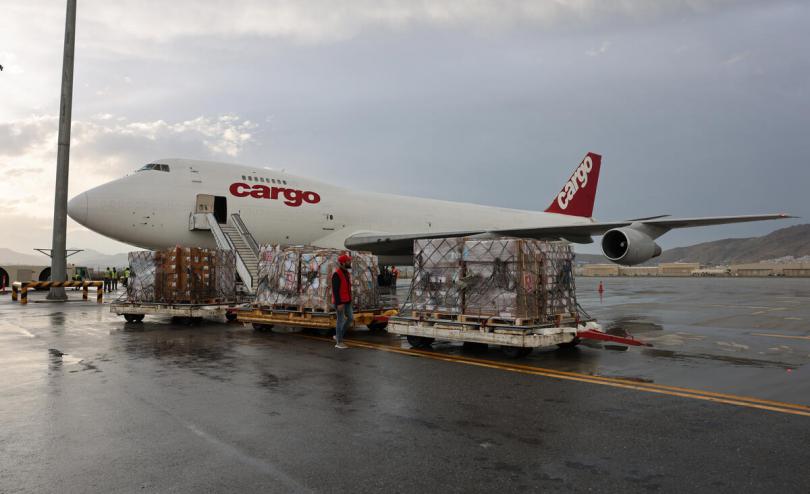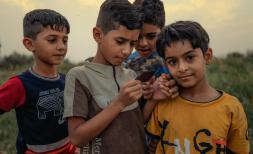Afghanistan: Nearly 400,000 children to receive medicines from humanitarian aid flight after rise in preventable illnesses

AID SHIPMENT PHOTOS and VIDEO: http://www.contenthubsavethechildren.org/Package/2O4C2SOIUHS2
KABUL, 30 April 2024 – A plane carrying 92 tonnes of vital medicines has arrived in Afghanistan to treat about 675,000 people, including children with life-threatening but preventable illnesses after an increase in respiratory infections and measles this year, Save the Children said.
The consignment – the largest delivered by Save the Children in a year - will provide lifesaving treatment for nearly 400,000 children afflicted by endemic childhood illnesses such as respiratory tract infections, pneumonia, acute watery diarrhoea, and skin diseases.
Over the past 3 months, Save the Children’s mobile health teams working in 8 provinces treated nearly 69,000 cases of acute respiratory infections in children under the age of 5.
Since the beginning of 2024, more than 1,000 children under the age of 5 have died after contracting pneumonia, comprising 88% of all deaths from respiratory infection [1]. The current number of cases is higher than the average number reported during the past three years, according to the World Health Organisation. The number of cases of measles among children under five has risen by 44% compared with the same period last year.
Nearly 18 million Afghans – or about 40% of the population - have limited access to health care [3].
The 92 tonnes of medicines will be distributed across Save the Children’s 58 static and mobile clinics, which are positioned to reach the most marginalized and underserved communities who live between 15 and 95 kilometres away from public health clinics or hospitals.
In March, Save the Children health teams carried out about 86,500 consultations, including with 2-year-old Shekib*. He lives in a remote part of southern Afghanistan and weighed less than 9 kgs (20 pounds) when his family brought him to a Save the Children clinic. He was hardly eating and had dermatitis caused by vitamin deficiencies.
Zarif*, Shekib’s* father, said:
“I took my son to various private hospitals and nearby clinics for his treatment, but his health condition did not improve and, in fact, worsened day by day... so, I brought Shekib* to the mobile health team, where the doctor examined my son and provided him with medicines. After a few weeks, my son recovered and was back to health.”
Arshad Malik, Country Director for Save the Children in Afghanistan, said:
“Too many children in Afghanistan die from easily preventable diseases and illnesses. The arrival of these medicines means that more than 400,000 children will receive potentially lifesaving treatment in some of the most remote areas of the country.
Every day around the world, roughly 16,000 children under the age of 5 will die from common illnesses that can be prevented and treated [4]. This aid delivery is part of Save the Children’s commitment to ensure that no child dies from preventable causes before their fifth birthday – but we cannot fulfil that commitment on our own.
We are grateful to the various international donors that have made this shipment possible, but more funding for Afghanistan is needed to ensure that children in some of the most marginalised and underserved areas of the country have a future.’
The medicines, which are worth about US $590,000, were donated by the Dutch Relief Alliance (DRA), the European Union Humanitarian Aid (ECHO), the German Federal Foreign Office (GFFO), USAID’s Bureau for Humanitarian Assistance (BHA) and Save the Children’s internal Humanitarian Fund, among other organisations.
Save the Children has been supporting communities and protecting children's rights across Afghanistan since 1976, including during periods of conflict and natural disasters. We have programmes in nine provinces and work with partners in an additional seven provinces. Since August 2021, we've been scaling up our response to support the increasing number of children in need. We deliver health, nutrition, education, child protection, shelter, water, sanitation and hygiene, and livelihood support.
*Name changed to protect anonymity.
[1] https://www.emro.who.int/images/stories/afghanistan/Outbreak-Situation-Report-Week-14-2024.pdf?ua=1
[2] Historic disease outbreak reports at https://www.emro.who.int/afg/information-resources/infectious-disease-outbreak-situation-reports.html The number of cases of measles among children under five increased from around 9,000 in just over three months from the start of 2023 to early April 2023, to around 13,000 in the same period this year.
[3] https://reliefweb.int/report/afghanistan/humanitarian-action-children-2024-afghanistan




